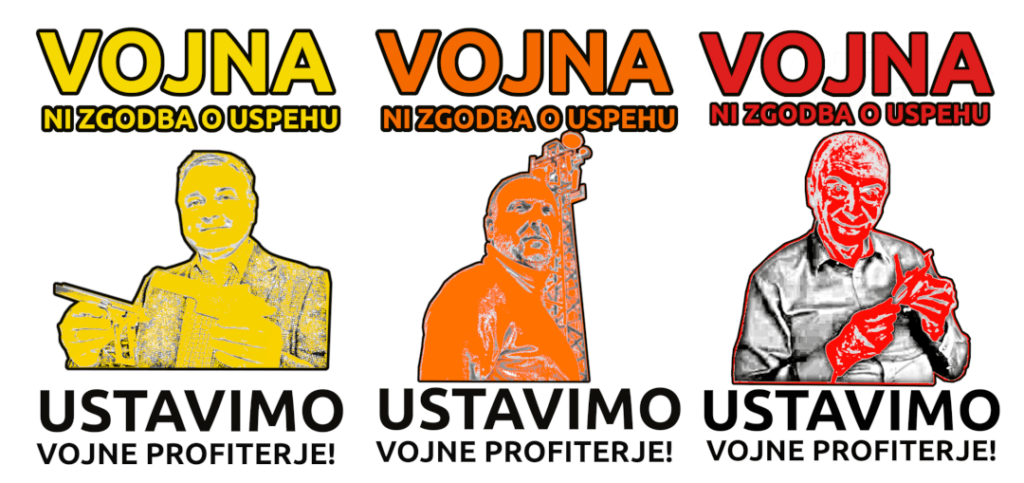The Initiative against Militarism has carried out several communication actions in several localities in Slovenia that host production facilities of arms companies. These included posters and the distribution of a large number of leaflets in town centres, in pedestrian zones and on cars. The actions were carried out in Ajdovščina, where Pipistrel and C-Astral operate, in Šentjernej in Dolenjska, where Arex has its production plant, and in Vipava, where Timtec Defence is based.
In a climate of continued genocidal war by Israel against the people of Gaza and predictions of escalation of the war in Ukraine and even of its widening, Slovenia’s role in these and other wars has recently received increasing attenon. Recently, it has been revealed that the Port of Koper is very likely part of the logistics chain supplying Israel with weapons. There is also increasing talk of the potential use of Slovenian territory for the passage of NATO forces into Ukraine. The arms industry operating in Slovenia is also receiving more and more attention.
At the same time, the Initiative against Militarism released a longer text War is not a Success Story focusing on the three leading figures of these companies and on the link between the State, public money and the arms business. Tim Castagne, Ivo Boscarol and Marko Peljhan are some of the most prominent arms industry and war profiteers in our environment. The Initiative claims that the purpose of their intervention is to contribute to public information about the activities of these companies and the careers of their leading figures, and to publicly denounce and stop their activities in the field of armaments and war. As the Initiative claims: “war [is] a process driven and directed by flesh and blood people, with names and surnames, with faces, with personal biographies, with families, friends and neighbours.”
Below some photos from the streets of Ajdovščina, Vipava and Šentjernej na Dolenjskem.
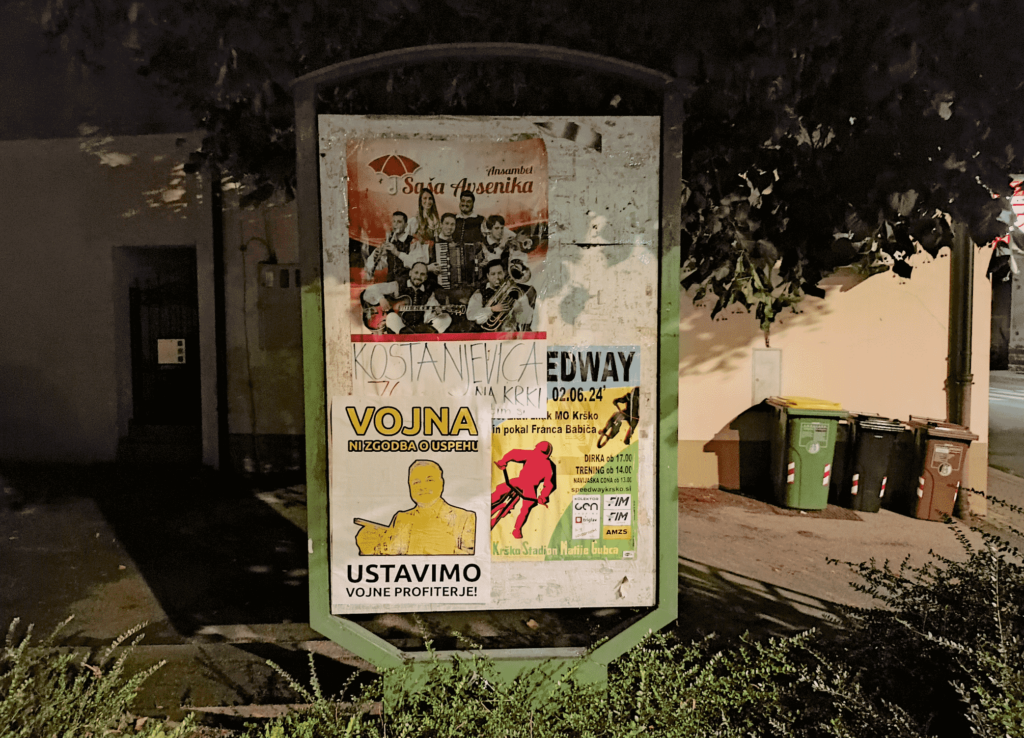
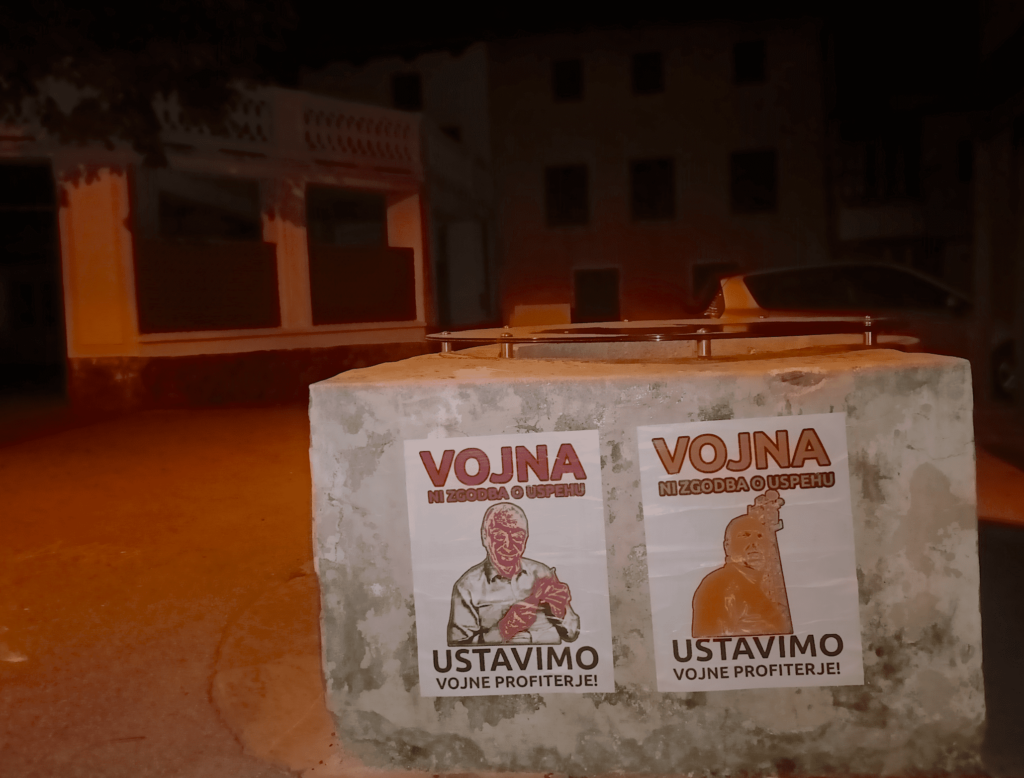
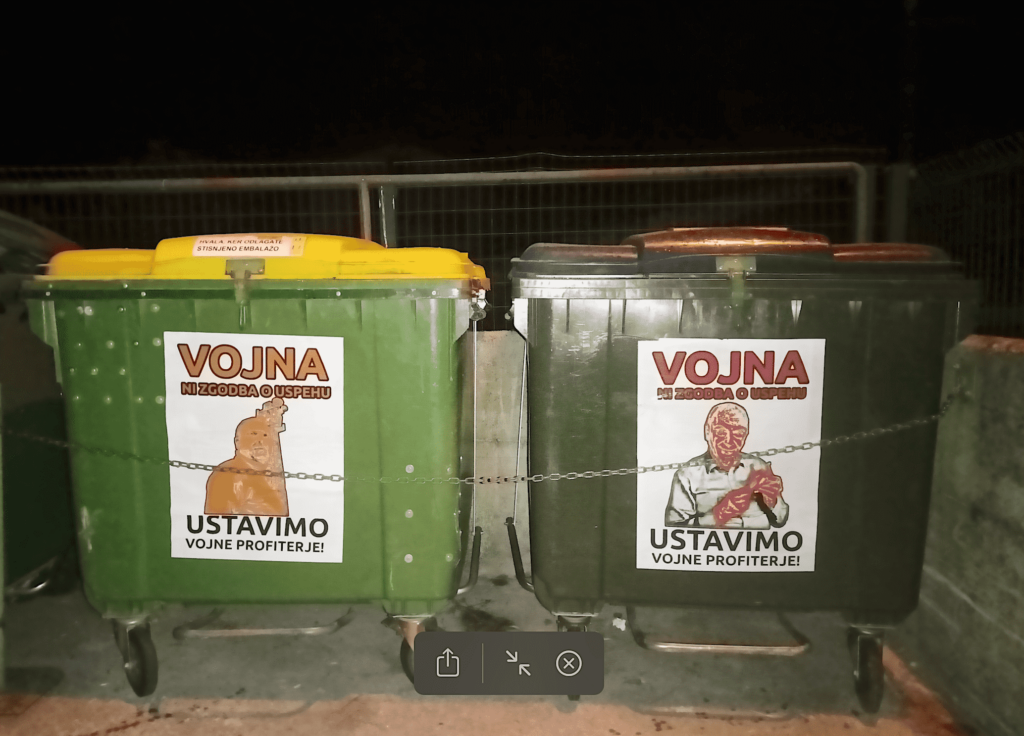
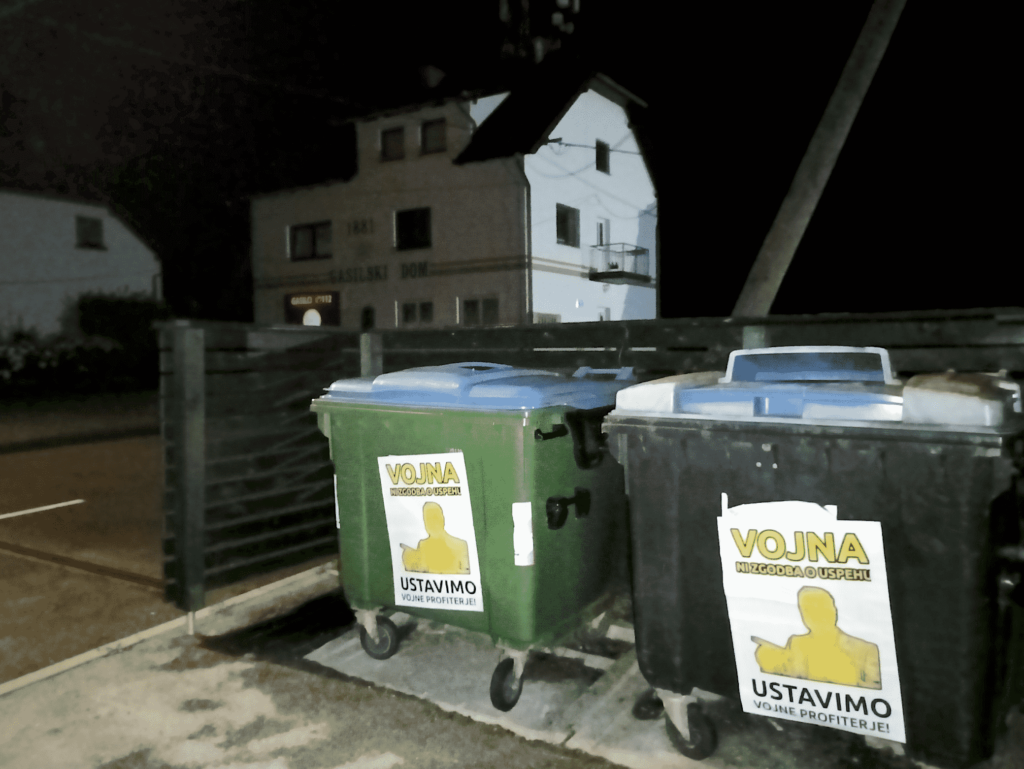
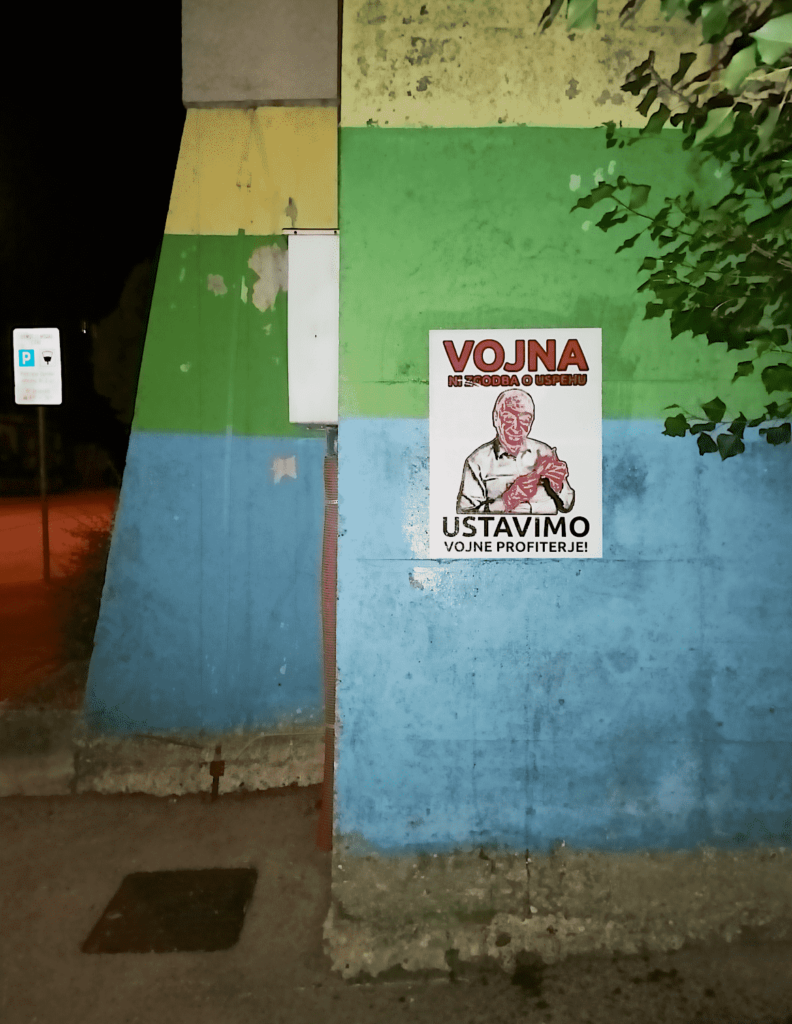
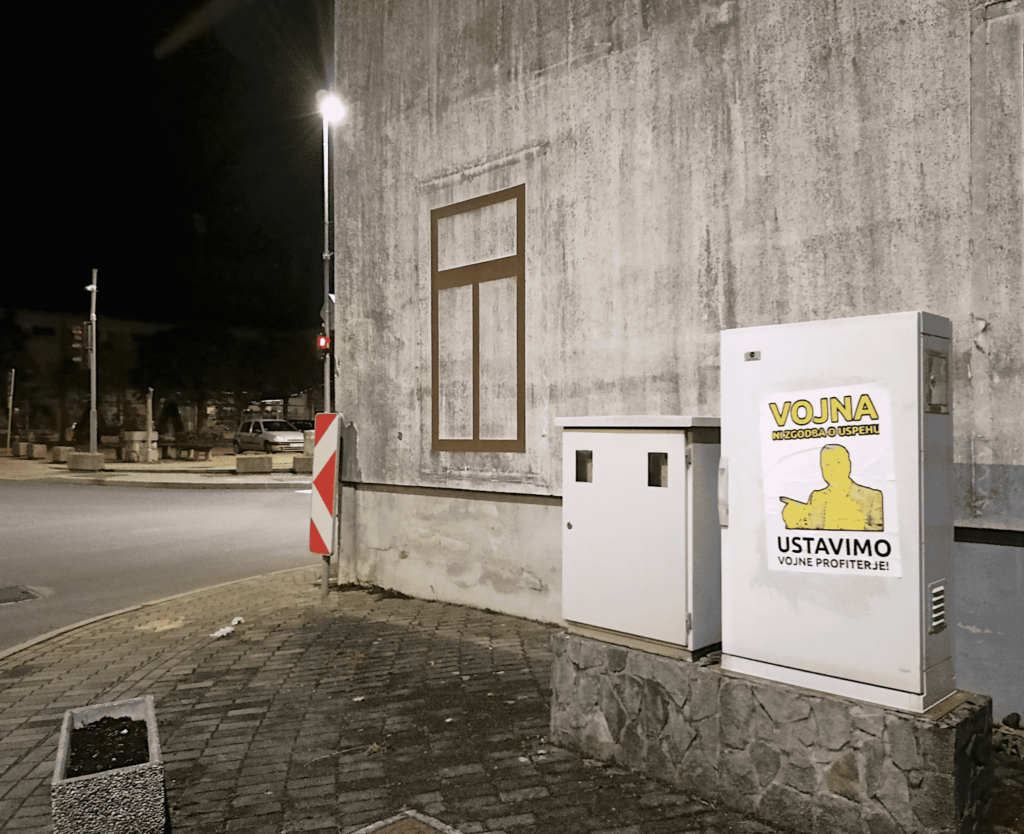

War Is Not A Success Story
Below is published a longer analysis articulated by Initiative against militarism on three visible personalities of Slovenian arms industry. It represents a continuation of an ongoing investigation into the ways in which war and arms industry is embedded in the geography in Slovenia just as it is in many other geographies around the world. Read more in two longer texts that precede the one published here:
- War is Here (November 2023)
- War starts here (November 2023
War has crept into our lives. It persists as a permanent media backdrop to our daily lives, thanks to the live audio-visual coverage of the horrors of the human world. At the same time the propaganda machine, harnessed to its continuation, becomes ever more vulgar and aggressive. War as an image of the general destruction of cities and of life. War as an inherent part of anxious casual chats with friends and acquaintances and as a part of the dark vision of the future for all of us. War as a subject of the most intimate personal reflections. Slowly, slowly, the various names of war around the world have crept up on us, and in its promise of coming escalation of destruction, it is becoming a tangible part of our reality too as the political class in various corners of the continent shouts in unison for an immense increase in armaments and promises yet more war. Increasingly, even near us.
At this point, there is no longer any doubt: the war is here and the war starts here. Many structures and persons from our local environment are actively involved in it. They benefit from it in very tangible financial ways, they use it to increase their already enormous political influence, and they directly affect our lives. They actively participate in the destructive processes that are killing people around the world and simultaneously work locally to create a social climate that internalises war at least to the point that it would be accepted as a necessary evil, if not as a righteous expression of the struggle for so-called democracy, male pride and female emancipation. War and military propagandists invest in dehumanising the victims of war, in building feelings of fear and hate, and build support for genocide by nursing indifference to the victims. They are invested to the hilt in the war industry, systematically inject its interests and values into the society, presenting them as universal.
In our part of the world, on the edge of the Balkans, bombs are not yet falling, people are not dying from mortar or sniper fire, but quite a few cogs of the war machine can be found at work here too. Many local companies either produce weapons or their components or sell and resell them. Some train both the experts and the cannon fodder for war. The military industry and the military are the focus of a systematic public campaign in which they are presented as something desirable and useful. Practically not a week goes by without some Marjan Šarec [acting Secretary of Defense] or other low-level official publicly salivating at the prospect of new arms deals or military conflicts.
It is our responsibility not to remain silent about these processes that are taking place in our local environment. We should try to understand them, to speak out about them and to do all this with the aim of contributing our piece to the mosaic of wider societal efforts to stop them. That is the purpose of this text.
Wars, the war industry are material expressions of war ideology and a result of the interaction of various processes that take place in the name of abstract categories such as capital, profit, national interest, the market, national security and so on. These processes are based on systems of apparent rationality, that have at their centre models, algorithms, calculations, all of which are in turn based on completely arbitrarily determined variables, and where sentimentalities such as concern for fellow human beings or nature are practically superfluous. But for all the efforts at automation, abstraction and, more recently, much-vaunted ‘artificial intelligence’, war is a process driven and directed by human beings from flesh-and-blood, with names and surnames, with faces, with personal biographies, with families, friends and neighbours. This equally applies to those who occupy the lowest ranks in the hierarchy, those with more responsibilities and those at the very top. No matter how much they personally try to abstract themselves and others from the blood, it is on their hands. No matter how much they invoke the laws of the market and the needs of the state, the blood is still there. No matter what ideological platitudes they recite, the red river flows from their hands.
This is also true for the Slovenian arms industry and the people who make it up. Among them, we find a number of interesting personalities whose personal trajectories, the values they invoke and the places they occupy in the society add significantly to the understanding of what our society really is. In this text, we focus on three enterprising figures from our environment, yet the list could be extended to include many more. Each of this ‘dream trio’ has arrived at their current place in the hierarchy of war by their own path, but all of them are now deemed to represent a ‘success story’. In capitalism, this title goes to those who manage to generate large amounts of wealth, whatever the means and whatever the costs, whether environmental, labour or in the form of lives lost.
Tim Castagne – Arex
Let’s start with the most obvious example: Tim Castagne is a CEO of Arex d.o.o., the largest arms manufacturer in the country, based in Šentjernej in Dolenjska. Its main products are ammunition used in combat training, pistols and cartridge links. In 2021, just before the start of the Russian invasion of Ukraine, the company made a profit of €1.4 million, with sales jumping by 40% in 2022. The company has a long history. It emerged from the bankruptcy of Iskra Pons and then after a classic example of privatisation during an initial transition to capitalism ended up in the hands of a local arms baron Ivan Kralj. It stayed under his control for a long time and was then in 2017 sold to the Czech Republic-based RSBC capital fund. The new owner chose Tim Castagne to serve as a CEO. All along the company has been successfully attached to the state budget, as it has a strong business relationship with the Ministry of Defence (MoD) and the Ministry of Interior (MoI).
Tim Castagne has been a CEO of Arex since 2021, and the local media has virtually nothing but praise for the company’s business successes under his leadership. He started his career in the 1990s at Lafarge and Karsdorfer cement works. The former, at least, is known globally for its highly destructive production model, which systematically kills people and nature. Tim though soon turned his attention to the arms industry. Before coming to Dolenjska, he worked for several German arms manufacturers such as Carl Zeiss Sports Optics, TRANSARMS and J.P. Sauer & Sohn, but his most important work references are the globally important arms concerns SIG Sauer and Heckler & Koch.
Tim Castagne is a loyal employee of the arms industry. Not only is he considered by his bosses to be a skilled salesman and manager, he is also its ardent public defender. What makes him special is that he defends the arms industry on the ground that it is a distinctly ethical activity and he views his role in it practically as an expression of humanity. In his speeches he likes to say that it is “one of the most regulated industries, the purpose of which is to protect people and ensure their safety”. In the same interview, he goes on to argue that the production of land mines is unethical because they can harm those who are not involved in the military conflict, i.e. the civilian population. At the same time he openly enthuses about the production of larger calibre ammunition, right up to artillery grenades. It is as if the rifles produced by Arex d.o.o. and the cartridges involved in the alliances that are mass-marketed throughout Europe do not lead to torn bodies. The apparent ethical stance thus ends precisely at the point of the weapons produced by his company, i.e. at the point of his personal interest.
The emptiness of Tim Castagne’s invocations of ethical considerations is also confirmed by the performance of Heckler & Koch, where he was hired as Sales Manager after his predecessor had been charged for criminal offenses in 2010 and got entangled in legal proceedings. In a case against Heckler & Koch a German court concluded that it had illegally trafficked weapons to Mexico. Moreover, the G36 rifles that were the subject of this illegal trade were used in an attack on Mexican students in Iguala, Guerrero, in September 2014. In it, 6 students were killed on the spot, 40 were wounded and 43 are still missing and are known as the Ayotzinapa 43. In 2019, a Stuttgart court sentenced Castagne’s predecessor and another former employee of the company to a suspended prison sentence. Three other defendants, including two of the company’s former CEOs, were acquitted and the company was fined by a German court.
Tim Castagne says that in Slovenia, the company “by law is not allowed to supply arms directly to the countries at war, which is why we, as the largest defence company in Slovenia, do not do business with Ukraine”. But he also happily boasts of increasing profits from indirect deals with those who do send arms there. It should also not be ignored that Tim migrated from Eckernförde in Germany after SIG Sauer was forced to close its production facility there due to legislative restrictions on the production of so-called sport weapons. Tim is certainly happier in the Balkans with looser legislation and more open possibilities for arms trade across both oceans, and with more obedient or helpful government cabinets. Tim Castagne himself praised the Slovenian government: “There are people within the government who actually know the projects that are going on, who work closely with industry and who know what they need. And that is a great relief for us. It’s much better to work here because you have the feeling that the response of business and their expectations are taken into account.”
Tim Castagne is fond and quite unashamed of drawing perverse parallels In defence of the arms industry. In an interview, when asked “how does he respond to the accusation that this is an industry that cynically profits from the dying and suffering of people”, he replied: “You know, then we can also say of doctors that they profit from suffering and dying.”
Another classic area of Castagne’s defence of the death industry with ethical arguments is the supply of weapons and other equipment to the police. He believes that by doing so, the company enables the police to protect citizens effectively. He conveniently omits, of course, the fact that the police themselves are globaly and throughout history responsible for a huge number of violent deaths. These crimes do not only occur in the United States, where hundreds of black (and other) people are murdered by the police every year, or in Brazil, where the number of police murders go into the thousands every year. In Slovenia as well the police persecute, harass, torture and otherwise terrorise people on a daily basis, and not infrequently this results in their deaths, most often in the Kolpa River or on the roads.
Based on publicly available information, it is already possible to conclude that Tim Castagne is an experienced operative of the military-industrial complex. As such, he has been placed in Šentjernej due the strategic connection between of the Slovenian state military industry and global arms capital. There he is not only developing ‘his’ arms company, but also using his position to lobby for the arms industry – both locally and in general – and at the same time to successfully deal in arms as far away as Brazil.
Ivo Boscarol – Pipistrel
The name of the second major figure in the local arms industry may come as a surprise to many, such is the image that he enjoys among the local public thanks to his long-lasting positive PR efforts. Yet that is precisely why he should be given even more attention. Ivo Boscarol founded Pipistrel in 1989. The company was meant to design and manufacture ultra-light aircrafts. He was its owner until its sale in 2022 and its CEO for many years. Today, he retains a shareholder and has been appointed Chairman Emeritus.
Ivo Boscarol is a politically well-connected figure who presents himself as “one of the richest Slovenians” and as the epitome of the neoliberal fairy tale of a local version of the so-called American Dream. And while he presents himself as an example of a local hero who, under the guise of betting on innovation and technology and caring about the local environment and the future of humanity, generates enormous amounts of capital, he may also even be contributing a globally significant piece to the jigsaw of military industry.
Recently, there has been a renewed media campaign to create a positive image of him, which indicates his even greater involvement in official politics. The story Ivo Boscarol is trying to sell is a Slovenian “success story”, of an “enviable career” and of a “likeable man with a vision”. In his case, this success is built largely on his collaboration with one of the most brutal military organisations in the world – the US military. “To work for the US military is to be held to the highest standard and if they accept you, the product is good”, Ivo Boscarol boasted in an interview.
Pipistrel is widely regarded as a manufacturer of civilian ultralight aircraft and its involvement in the arms industry is not widely known. It is time to throw some light on the issue. The veil of secrecy was temporarily blown off Pipistrel’s arms business by the crash of an “ultra-light drone”. The crash occurred near the city of Erbil in Iraq, specifically in Iraqi Kurdistan in the north of the country. The estimated value of the aircraft was €3.4 million. The lost aircraft was most probably in the service of the US military, which, in the words of Ivo Boscarol himself from 2021, was a long-standing Pipistrel customer: “If the world’s largest manufacturer of military aircraft – the USA – has been ordering aircraft from Pipistrel for the most demanding missions for seven years and has now renewed the order, it is the greatest tribute to our, and at the same time Slovenian, know-how and quality.”
Despite occasional self-promotion, accidents and other revelations, Pipistrel’s military business is still covered by a thick veil, no doubt because this suits its political godfathers and protectors. For the time being, only fragments are in the public domain, but they show conclusively that the company is not to be underestimated in any way. Pipistrel signed a $63 million deal in 2020 with the United States’ Special Operations Command (US SOCOM), a special operations command centre representing the various branches of the US armed forces (Marine Corps, Air Force, Armed Forces, etc.). Judging by its own presentation materials online, US SOCOM is developing partnerships with a number of companies, universities and researchers. Its knowledge, skills, personnel and other resources are not only available to the US authorities, but also to governments or other interested actors around the world. Always, of course, in the name of “fighting terrorism” and “maintaining local security”.
Its list of partners includes companies in Israel, and since the Obama administration, US SOCOM has trained special forces of the Ukrainian army. There is virtually no war or crisis zone where US SOCOM is not involved. The US military has also boasted that US SOCOM had played the most important role in the 2003 invasion of Iraq. Among current engagements, it is worth highlighting that it is involved also in Gaza, where it supports the Israeli occupation army in planning operations for the alleged liberation of hostages and in other activities that take place in the context of the genocidal war against the Palestinians.
Pipistrel aircraft and drones are used in these special operations around the world, and this is the real heart of Boscarol’s Pipistrel’s “success story”. For military use Pipistrel is marketing the Surveyor drone, which is said to have already been integrated into various units of several militaries around the world, including the Indian Army. Among the custumers is somewhat surprisingly also the Chinese Ministry of Defence.
Ivo Boscarol sold Pipistrel in April 2022 to Textron, the US arms giant, which continues to steer the company towards the military industry. The new CEO of the company is Gabe Massey, who has extensive experience in the arms industry. For example, before joining Pipistrel he worked on the Bell 525 Relentless helicopter programme, which will also have a military version. It is claimed that Boscarol made €220 million from the sale and retained a 10% stake in the company. He subsequently invested a lot of capital in the purchase of large plots of land in Ljubljana, among them the site of former Kolosej cinema complex and the Žito warehouses in the BTC area. He is also investing heavily in the arms industry. Together with his daughter, he recently acquired a share in Timtec Defence, a start-up company run by his local arms partner, about whom more is written below.
Ivo Boscarol invests heavily in building a positive public image of him as a local hero. For this purpose he employs heavily slogans about innovation, technology and care for the local environment and the future of humanity. Every investment he makes in the local environment and charity is well publicised. He has also arranged that an honorary PhD from the University of Nova Gorica was given to him. His success story is received so well also because it is rooted in the idea of hard work which is highly valued locally. Not only does he present himself as a person who has achieved success on his own, he adds to this the image of an enlightened “revolutionary” from the future, showing us the way of reason and human courage. Ivo Boscarol’s cult of personality is successfully pushed with the help of the local and national media, which regularly give him space and at the same time rarely deal with his arms deals. Thus – judging by the helpful media – Ivo Boscarol supports local communities, cares for young families with the idea of investing in building new “smart neighbourhoods”, deals with the future of nutrition and the ecological challenges of the world, donates millions of euros to firefighters, and says that he “lives modestly”. He is also claiming: “one day I want to fly to the heights, all the way to the stars…”.
Behind the supposed success story of an innocent little light aircraft manufacturer in the Vipava valley, lies one of the most abhorrent sectors of capitalism – war. This is probably the reason why Ivo Boscarol has long been so systematically elevated to the status of a messenger of an important part of the local political and capitalist elite. It is very likely that we will continue to see him in various arms and political stories in the future.
Marko Peljhan – C-Astral
Finally, let’s turn our attention to what is probably the most unexpected face in this trio. Marko Peljhan is the founder and, at least until recently, one of the directors of C-Astral, a company that produces drones, cooperates extensively with the Slovenian Armed Forces – which, for example, uses his Belin systems – and with NATO. The official website of the Slovenian Government states that “C-Astral is a world leader in small drones. They are flying in more than 70 countries.” For Marko Peljhan a special place among the latter goes to Ukraine, where a war is going on for a long timeand in which the company has been directly involved. He is also enthusiastic about this: “(…) the outbreak of the war [in Ukraine] acted as a catalyst for our activities. The interest has been tremendous, as decision-makers have realised that there is a need to invest in the systems we produce. The Ukrainian war is proving to be a high-tech conflict that is triggering a whole bunch of positive synergies for our industry.” C-Astral is based in Ajdovščina, less than a kilometre from Pipistrel’s headquarters.
Marko Peljhan entered the public frame in the mid-1990s as an artist, and as one of the most prominent or successful artists of the golden period of Slovenian transition from the mid-1990s to the global financial crisis at the end of the first decade of the 21st century. In 1997, he participated in Documenta X in Kassel, and was later a guest artist at numerous other biennials, festivals and other contemporary art events around the world. To mention a few: Venice Biennale (2003 and 2019), Ars Electronica in Linz (2001), where he was also awarded), Gwangju (2002). His Macrolab project, which was generously sponsored by Mobitel, at the time a virtual monopolist of the state-owned mobile phone market, enjoyed a lot of public attention. He was also extremely active in the institutional sphere, as in the mid-1990s he was one of the founders of Ljudmila [Ljubljana Digital Lab] and the Projekt Atol Institute, which still serves as a formal home of the electronic music label RX:TX and organises the [locally] well-known PIFcamp. He was also one of the initiators of the predecessor of the Slovenian Space Agency, the Centre of Excellence in Space, Science and Technology, which became active in space and aeronautics research in 1998. Marko Peljhan is also a professor at the University of California Santa Barbara. He has a lot of other institutional engagements and titles and if all of these are considered together they conclusively indicate a person who has been for decades extremely well networked and positioned within the systems of arts, science and research.
But all this is now rather marginal compared to what the same Marko Peljhan from Šempeter near Nova Gorica is doing today. His company, C-Astral, develops and manufactures military drones and through the Slovenian Ministry of Defence sells them to the Ukrainian army for use in the war there. C-Astral was founded by Marko Peljhan at the end of 2007, with the active support of the aforementioned Ivo Boscarol, the University of Nova Gorica and the Ministry of Defence. Judging by the active media coverage in the specialised press, Marko Peljhan, in his role as a senior executive and at the same time as one of the major owners, has recently been in the process of finding a so-called strategic investor to take the company under his wing, significantly increase its production activities and firmly anchor it in the NATO military-industrial complex. This is confirmed by the fact that C-Astral has for some time now been regularly participating in NATO military exercises, such as Adriatic Strike,. In addition to the local army and its affiliates, the Bramor drone, which is described on its website as ‘battlefield proven’, is used by at least the armies of Cameroon and Bangladesh. According to Peljhan, after a start-up period, it is now clearly time to move on: or in his words, “There is no doubt that our company today needs a strategic, capital partner. We are still specialised in terms of adapting to the needs and requirements of our customers, so the production volume is relatively limited. Mass production is a very expensive project that we cannot carry out on our own through organic growth.” At the same time, he is acting as a promoter and, in all likelihood, a lobbyist vis-à-vis the various public authorities of the Slovenian state, not only for his arms company but for the military industry as a whole.
Since recently Marko Peljhan is also the CEO of Timtech Defence, a company that develops electronic weapons to fight drones. In 2022 it recorded three times more revenue than the year before. Currently a one-third stake is owned by Ivo Boscarol, another one-third stake by his daughter and the rest by Infinium, a company owned solely by Dakte. A brief dig through the company register reveals an interesting layering of ownership that deserves serious attention from a researcher’s eye and is typical of activities that should remain as hidden from the public eye as possible. Timtec, about which we are likely to hear a lot in the near future, intends, among other things, to design a system of aerial surveillance cameras. They are working with the Ministry of Defence on this project. As its representative said, “market potential is assured” – and that is the whole point of what – being a weapons manufacturer – it is all about.
For those who have known Mark Peljhan as an exhibitor at Kapelica, a prize winner at Ars Electronica, and an electronic music publisher, his career as a weapon developer and producer may come as a surprise. But a look at his work shows that there are probably no good reasons for this. In fact, his entire artistic career is linked to military technology. Taking for example an interview in the Journal for the Critique of Science in 1997, which was undoubtedly made due to some mistake, Marko Peljhan clearly stated there already for his project at that time (the interview was conducted via e-mail): “The military technology in UCOG-144 [is] an integral part of the project, and here I have no reservations.” This project was about the use of satellite navigation for mapping and real-time orientation in space. The core of the project was a military technology-based digital communication system for remotely controlled and guided movement in space in real time. There is a straight line from this ‘artistic’ project, which was dressed in then fashionable clothes of the Situationist International, to the Bramor drone used by the Ukrainian army in the war. The other projects that followed (Macrolab and S-77CCR) are also easily seen as points on the same line. Even if they may be disguised as tools of resistance, such as S-77CCR – Tactical urban counter-surveillance systems for ground controlled UAV’s (Unmanned Aerial Vehicles) and airborne drones to monitor public space, the truth of these projects lies in the current job of the artist more than in the exhibition catalogues.
As late as in 2019, Marko Peljhan participated as Slovenia’s representative at the 58th Venice Biennale with a project directly related to the war, about which Multimedia Centre of Slovenia’s National Radio and Television wrote: “The project Here We Go Again…System 317 is the last in Peljhan’s 20-year cycle of works Resolution, in which the artist provides concrete physical and practically feasible solutions to specific problems in society. According to the Moderna galerija, which together with the Projekt Atol institute is acting as producer, the project is based on the idea of using military technology and systems to develop a tactical means for one’s own endeavours.”
It seems that there has not been a break, a departure or a new beginning with Mark Peljhan. On the contrary, there is every indication that his entire trajectory has been marked by a consistent commitment to research and development of military technology. While he was working on his artistic career, it was not difficult for him to wrap this in the mantle of critical systems analysis, but he has long since largely put it aside in favour of direct participation in the war, the promotion of the war, and the earnings and benefits that go with all that. What he has been developing within the art system, he has been doing within the war system since 2007 at the latest. It is quite possible, however, that the affiliation with the latter has been present for much longer, perhaps even from the very beginning. Of course, we can only make indirect conclusions about this, but it is interesting to note the institutional connection to the strongest centres of Slovenian art, which persisted even at a time when he was already making deep and overt forays into the terrain of directly applied military technology, military organisations and war. When he was the Slovenian representative at the Venice Biennale in 2019 his project was co-produced by the Moderna Galerija, where he also gave a guest lecture on the same project in August 2019. A very interesting space for a person who is professionally totally involved in the arms industry and is a loyal partner of both the largest military alliance in the world and its local offshoot in the form of the Slovenian Armed Forces.
For the future, Marko Peljhan is betting on nuclear war, as C-Astral is part of a consortium planning an unmanned system capable of collecting samples in an area contaminated by radioactive radiation.
A Succes Story – For Whom or For What?
A glimpse into the three personalities behind the biggest or currently most successful arms companies in our country shows three enthusiasts who built local arms empires with their own hard work and ingenuity, and made a lot of money along the way. A closer look reveals that they achieved all this with the generous support of the Slovenian state as well as due to tying themselves to the global arms capital. For this reasons it doesn’t make much sense to see them as being pioneers or innovators, rather they should be recognized as the faces of the war system, as small subcontractors of the military-industrial complex, dutifully carrying out specific tasks within the international division of labour in one corner of the world that is militarily tied to the USA.
In the current social context, such personalities do not only have a managerial function, but increasingly also an ideological one. They are the leading voices through which the war apparatus speaks. The latter is very keen to recruit a wide variety of profiles for its destructive purposes. For exampke besides the supposedly successful managers top athletes are particularly desirable. The choice of the messengers of war, its interests and values, is not random, but is linked to the model of society imposed on us by the ruling elite.
In the neoliberal world, individualism is presented as the highest value. Behind the platitudes about autonomy and individual freedom, there lie brutal competition, intense self-promotion and images of personal success. The successful individual, as presented to us in the established discourse of the mainstream media, the political establishment and state institutions, is innovative, resourceful, adaptable and, above all, a successful entrepreneur. The economic and political realities of the capitalist system make this status possible only for a select few, while the vast majority of people face exploitation and mere subsistence. No wonder that the power structures keep repeating the myth of endless opportunities that “we can all take advantage of” if only we are “hard-working” enough. To reinforce this hallucination the ideologues are always on the lookout for “successful individuals” who have built a success story through their own “sacrifice”. Of course success is always measured in categories of market economy, more specifically in terms of wealth or capital. The measure of success in today’s society is not the discovery of a cure for a serious disease, or a solution to a serious human problem, for example in the form of an energetically and ecologically interesting process for purifying chemically polluted water, preserving fertile soil or ending poverty. Success is defined by the numbers on a private bank account.
One of the most effective ways to achieve success defined in this way is through the war industry. Contrary to the empty words about the individual genius of budding entrepreneurs, the arms industry can only be based on the active role of the state, which, by chanelling taxpayers’ money into “defence and security” ensures a constant flow of immense financial resources for armaments and war. Only under such conditions of systematic diversion of society’s resources into the arms industry, which is also abundant in Slovenia, can “successful businessmen” emerge who, under a fog of supposed innovation, pour money into the development of weapons for the destruction of life and the transformation of entire areas into wastelands of rubble and pollution. Today’s Arex is the successor of a state-owned toolmaking company, Pipistrel has maintained a special partnership with the Ministry of Defense for several government mandates, C-Astral has been a Ministry of Defense’s project from the very beginning, and all three companies rely heavily on funds from state budgets, not only Slovenian, for their development activities and operations.
What from the point of view of the universal ethics represents the worst crimes, in the world of war and arms deals, represents the best reference: weapons that have proven their lethality in war – battlefield proven. A good product destroys the enemy at an acceptable cost, quickly and massively, or enables another product to do so. If the user defines the enemy as the civilian population, those who oppose the war or vital infrastructure, that is part of the deal. All the successful entrepreneurs in this sector know this very well, including Tim Castagne, Ivo Boscarol and Marko Peljhan.
Precisely because this basic truth of the arms success stories is so blatantly obvious, the arms success stories resort to a combination of propaganda techniques to defend the indefensible. They shamelessly celebrate their business success while wrapping it in various socially more acceptable cellophane. In defending their work, they instil fear and feelings of threat, while at the same time they present themselves and their arms partners as the saviours who are the only ones called upon and competent to deal with security issues. On the other hand, through the appearances of charity, art or the invocation of ethics, innovation, ecology, social responsibility, community defence, they build an acceptable image of the arms industry in the local communities where their facilities were placed into. As creators of jobs and supposed development, they establish themselves as indispensable partners in shaping the society of the future.
Behind every Tim Castagne lies a huge capital that constantly determines the value or lack of it of the lives of millions. Behind every Ivo Boscarol there are quite a few well-paid servants with no conscience, driven by their own financial interests. Behind every Mark Peljhan there are states which, safely hidden behind a veil of silence, invest endless public funds in the machinery of death. All of this is firmly rooted in the daily exploitation of workers, many of whom would probably be happy to earn their wages in other ways instead of by serving the system of war. But unfortunately for many this alternative does not seem to exist for him or her, which is also a consequence of the arms industry investing aggressively in presenting itself as a job creator, a good employer and a company that is beneficial to the local community.
The products of these three heroes of local success stories add fuel to the fire of war, and the more it flares up, the bigger their profits, the more successful they are in business, the more charitable and socially responsible they can be, and the more local communities seem to depend on them. It is up to us to expose these people and their activities, to give them visibility, to condemn them as unacceptable and to act in every possible way to put an end to their success story.
WAR IS NOT A SUCCESS STORY!
THE WAR STARTS HERE!
STOP THE WAR PROFITEERS!
Initiative against militarism
June 2024

